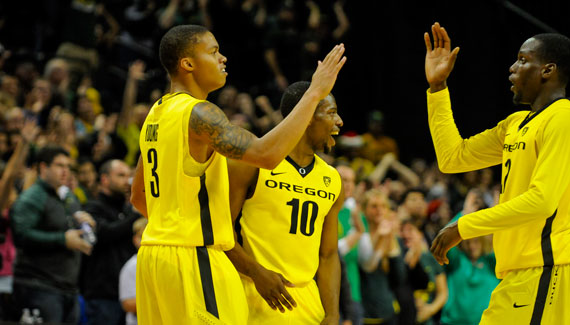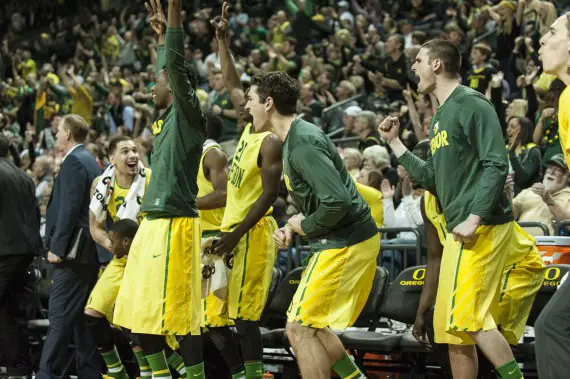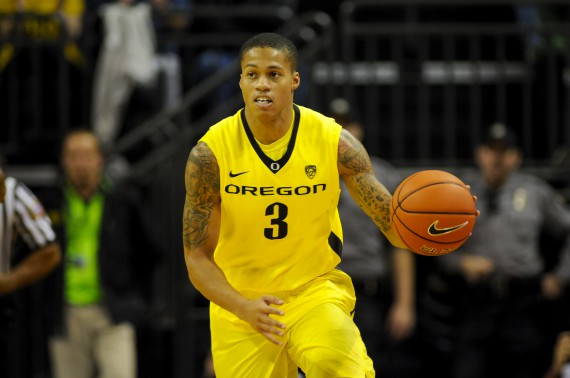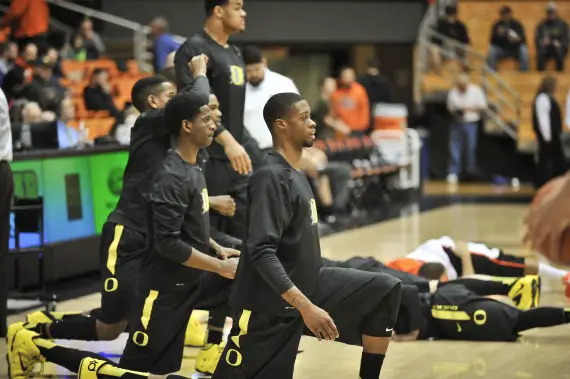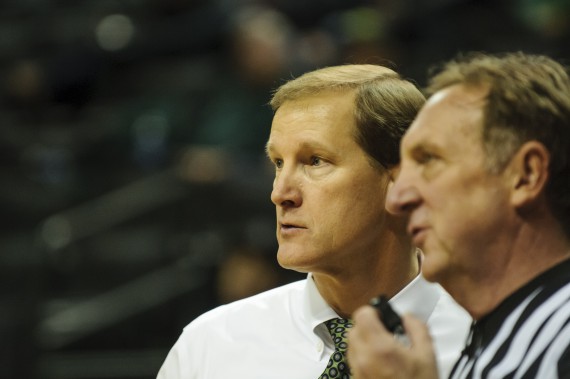With the 2013-14 Oregon men’s basketball season concluding on Saturday evening, there are two ways that the scope of the season could be viewed. One approach is to hang one’s head at the missed opportunity; disappointed at seeing a second consecutive Sweet 16 appearance (which would have been a first in the program’s history) slip away following the evaporation of a 12-point halftime lead. It is a perspective that sees frustration in a team with so much talent and such early season promise unable to get out of the tournament’s first weekend.
The other perspective would be from a longer lens, one that sees the season from its whole arc and the program from its whole. Likely few people, if any, thought on the morning of February 9th, following a two-point loss to Arizona State in Tempe, that this Ducks team would even have an opportunity to go this deep in the tournament. That night, a game which saw Oregon come back from 21 down, only to suffer their third two-point loss in four games, dropping the Ducks to 3-8 in the Pac-12 and leaving serious doubts about their postseason possibilities.
(That was also the same game where a student spit on Oregon’s coaches. Yes, the same student section that is currently being glamorized by Coke Zero in those YouTube ads as “real fans”. Maybe you should have vetted your subject material a little better, Coke Zero.)
Instead, Oregon didn’t lose another conference game all season, punctuating the season with a win over third-ranked Arizona that had them skyrocketing up the standings from the Pac-12’s bottom quadrant to its top – finishing tied for third – over the season’s final seven games. A win over BYU in its opening game of the NCAA Tournament meant that Oregon just finished its seventh-best season in the team’s 109 year history, something few would have anticipated following that mid-season slump.
So how do we evaluate this season? What could have been? Or what was achieved?
It’s the latter. This season was Dana Altman’s best coaching job since he’s been at Oregon, which is saying something given that he has won at least one postseason tournament game every year he has been with the Ducks. To pull a team out of its death spiral as he did following ASU, bringing them back to the NCAA Tournament (as a 7-seed, no less) when the team just as easily could have packed it in, shows why Altman is as good as any coach ever in Eugene. That kind of success shows why there is a lot to be optimistic about for the Ducks next season.
The Three Biggest Reasons to Be Excited About Next Season:
The Return of Experienced Scorers
If Joseph Young returns, his 18.9 points per game this season will be the highest scoring average by a returning player in over 20 years, ever since Antoine Stoudamire (who, like Young, transferred to Oregon after starting elsewhere) and his 20.5 PPG returned for the 1992-93 season.
Oregon fans hope he stays, but should Young choose to go, it would open the back-court up for Damyean Dotson, who never looked completely comfortable in his role this season, and Dominic Artis, who will benefit from a full season of play and potentially a more defined role next year. In the front-court, if the promise Elgin Cook showed during his performance against BYU in the NCAA Tournament could become routine play, the Ducks might be even be a better next season when you add in…
The Influx of Talent
While recruiting classes are never a certainty, having the currently 21st-ranked class is more of a certainty than other schools can count on. Recent commit Jaquan Lyle joining an already very impressive class leaves Oregon with as much hope for incoming players than they have had in a few years.
Then think about these names: Mike Moser, Joseph Young, Jason Calliste, Arsalan Kazemi, Tony Woods, Devoe Joseph, Olu Ashaolu, Jay-R Strowbridge; all transfers from four-year programs that no one knew would be on Oregon’s roster the year prior to their arrival, yet all of whom had an impact while playing for the Ducks. The landing of talented transfers year after year has been one of the great successes in recruiting for Oregon the last few seasons, finding the right transfers who can mesh with and contribute to this team. Why has that worked? Because…
Dana Altman Has the Program in a Better Place than Ever Before
While this year was the fourth time Oregon had been to the NCAA Tournament in consecutive seasons, the win over BYU on Thursday marked the first time in school history the Ducks have won tourney games in consecutive seasons. Had Oregon been able to win on Saturday, it would have been the fourth straight season that Oregon would have won multiple postseason games.
The history of successful Oregon basketball can be summarized like this: The Tall Firs, The Kamikaze Kids, Ernie Kent and now Dana Altman. In this article from The Oregonian‘s Andrew Grief on Altman’s use of transfers, Altman mentions that he went the transfer route because winning immediately was necessary to appease fans because “as you know, I wasn’t Oregon’s first choice”, referencing Oregon’s prolonged coaching search in 2010 that included names like Michigan State’s Tom Izzo and Butler’s Brad Stevens.
(Independent of Altman, it’s probably best Oregon never landed Stevens. If Stevens, who left Butler to coach the Boston Celtics in summer 2013, made that move while coaching at Oregon, the shock of a scenario where two head coaches would have been lost to the pros in less than six months would have put Ducks fans into a catatonic shock they would still be recovering from.)
Altman may not have been Oregon’s first choice, but he has definitely been the right choice. For the 105 seasons prior to his arrival, the Ducks had great individual seasons, years of peaking amidst otherwise unremarkable seasons. Under Altman, Oregon is good now and still ascending. Enjoying one of its first sustained periods of season-over-season success in school history, and Altman hasn’t even gotten traction with his own freshman recruiting classes yet. Knowing the potential that lies ahead in November, and the future, is promise enough to have Oregon fans looking forward to another great year.
Top photo by Craig Strobeck
Related Articles:
Chip Kelly Update: Everything's Good Again ...
Chip Kelly Update: Wailing and Gnashing of Teeth
Shock and Awe -- The Oregon Ducks' Football Hangover Effect
Despite Lopsided Score, Georgia State "Never Stopped Believing"
Hope Springs Eternal for Ducks
Incompetent Pac-12 Officials: How Do You Miss ALL of THIS?
Nathan Roholt is a senior writer and managing editor emeritus for FishDuck. Follow him on Twitter @nathanroholt. Send questions/feedback/hatemail to nroholtfd@gmail.com.

